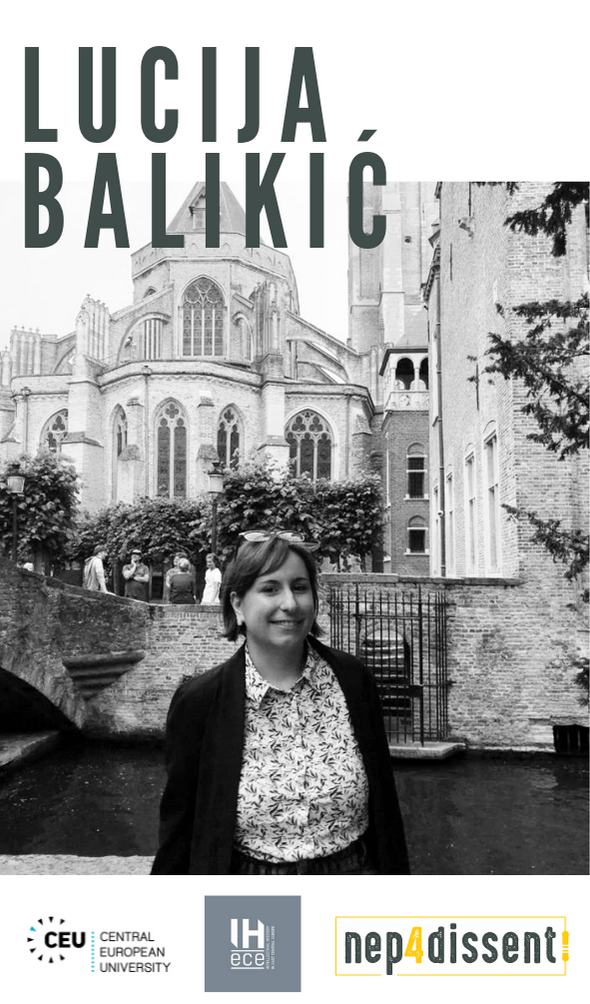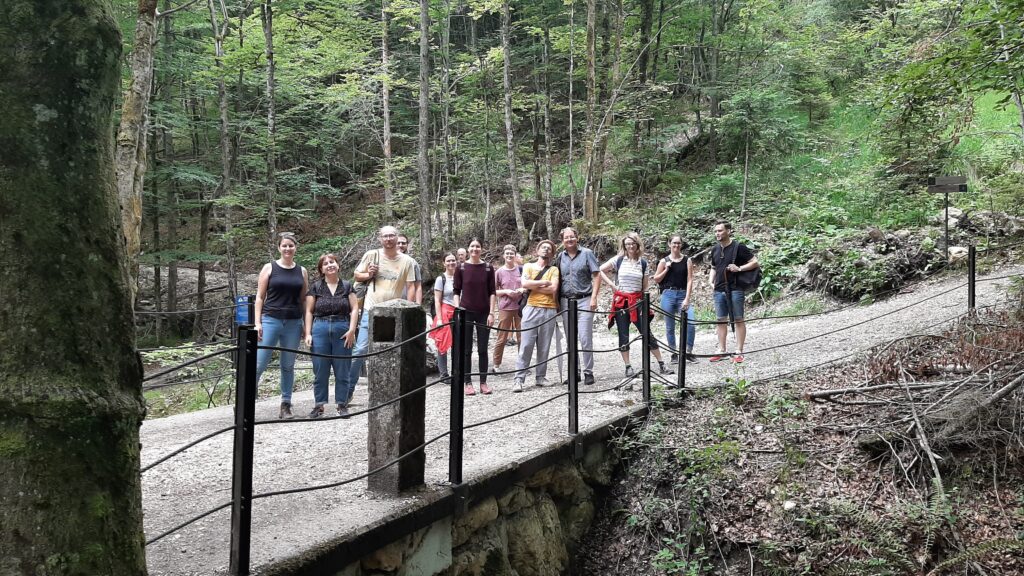Political Thinking in Times of (and about) Transitions in East Central Europe. Reflections after Summer School
Author: Lucija Balikić
19/08/2021


Intellectual History in Transition pilot summer school, co-organized by the Institute for Contemporary History in Ljubljana (Inštitut za novejšo zgodovino), IH ECE research network (Intellectual History in East Central Europe) and COST Action NEP4DISSENT, took place in Ljubljana between 16th and 20th of July 2021. It consisted of two thematic parts, first focusing on the recent trends and debates in the field of intellectual history, and the second on the topic Transitions in East Central Europe: An Intellectual History Approach. The detailed program of both parts, as well as the list of participants, can be found here. While the former was primarily based on discussing the preassigned state-of-the-art readings pertaining to several distinct subfields or fields adjacent to intellectual history – such as literary history, history of science/knowledge production, global history and history of political thought – the latter has taken the form of a workshop whereby the participants presented their empirical research in regard to the various aspects and understandings transition, both as an object of historical research, and as an interpretative frame in historians’ work.
The reading seminar on the history of philosophy, in particular on the history of phenomenology in East Central Europe, was led by Marci Shore (Yale University), while the ones on literary history and history of political thought were led by Zsófia Lóránd (University of Cambridge, UK), Adela Hîncu (New Europe College, Bucharest) and Balázs Trencsényi (Central European University, Budapest) respectively. Moreover, reading seminars with Anna Calori (University of Leipzig) and Franz Fillafer (University of Vienna) focused on the questions of scale, global history, history of the empire and (de)colonisation.
The workshop sessions on the topics such as ‘Narrating Transitions: Usable Pasts, Futures and Temporalities’, ‘Between Actors and Observers: Intellectuals and Experts in Transitions,’ ‘The State of Transition: Changing Institutional Frameworks of Knowledge Production’ and ‘Shifting Vocabularies of Change: Ideologies and Concepts in Transition’ were commented on by three discussants, Adela Hîncu (New Europe College, Bucharest), Jure Gašparič (Institute of Contemporary History, Ljubljana) and Marta Verginella (University of Ljubljana).
The two parts were divided by one day of break, during which the participants visited the nearby lake Bohinj. With a number of scholars and researchers from different traditions of writing intellectual history present, the discussions oftentimes revolved around different theoretical and methodological issues related to the said field, as well as the (meso-)regional frameworks of the current scholarship. Namely, the theoretical canon of intellectual history (i.e. as opposed to political philosophy, history of political thought or discourse studies) was at stake and the main epistemological boundaries and contours of the field were debated, especially in the context of their scholarly genesis from the study of early modern texts at the elite Western universities. This raised questions of the relationship between the political ideas and the ‘nativity’ of their ‘original’ socio-political and temporal contexts, as well as about applicability and appropriation of these approaches to the study of East Central European modern intellectual history.
Some of the questions that were posed and tackled pertained to making the dominant approaches more comparative in nature, but also in other ways of transcending the naturalized ‘given’ of the modern nation-state. Here, the debates on global on the one hand, and local/urban histories on the other helped the participants to investigate the strategies of decentralizing the national narratives, but also offered refreshing new readings and conceptualizations of the transitions of 1918, 1945 or 1989. Nevertheless, the calls for globalizing the regional research through comparison or studying the global connections and circulations were also critically examined as a strategy, mainly in the light of the still underdeveloped scholarship on the regional intellectual history more broadly. The political thinkers and traditions of political thinking hereby discussed were studied in relation to their historical contexts and often regarded as agents of political change.
Together with this, there were many different aspects of writing about and understandings of transitions that were suggested by individual presenters and explored in the discussions. One of the recurring issues in that context was the (supposedly dialectical) relationship between political thinking, conceptual innovation and extra-textual concerns in the periods of large-scale political or social change. In other words, the question revolved around whether some of the political thinkers were initiators or at least, original interpreters of the ongoing changes, or they were prompted by the changes to adapt their conceptual apparatus and arguments to the new circumstances. With regard to diverging temporalities of various ideological traditions, we asked similar questions about newly established regimes’ historiographies and philosophies of history, noting that they often have a tendency to adapt and re-conceptualize them for the purposes of their political agenda, thus dubbing their desired outcome as natural culmination of the historical development.
To conclude, with a number of presentations and readings on various types of transitions (in terms of social-political order, state regimes, intellectual trends and traditions, conceptual changes) in different ideological, epistemological and aesthetic contexts – the participants were offered a chance to rethink the ambiguities of intellectual production under the process of transition, trace its dynamics and note relevant patterns that occured in case of regional thinkers throughout the modern period. With this extremely ambitious beginning and an inclusive approach to adjacent fields, themes, geographic frameworks, primary sources (going beyond the texts) and methodologies, the pilot summer school succeeded in starting the much-needed conversations on the regional intellectual history and its scholarly treatment, but also facilitated the exchange of experiences and strengthening the network of historians dealing with these ever relevant topics.
In the period of profound change, when the circumstances are prompting us to rethink political communities, democratic governance and state capture, as well as the very basis of our economic relations (not least in regard to the environment), it is more than worth to return to the inspiring works of those who found themselves in the similar moments of crises, changes and transitions, while having to navigate the geopolitical and economic interests of larger-scale entities from the standpoint of a heterogeneous region divided into smaller post-imperial states, often serving as a ‘laboratory’ for experimenting with alternative political ideas or the battleground of imperial(ist) projects. Establishing the tradition of this summer school would thus not only enable a stronger exchange of regional knowledge on currently relevant themes, but also allow the cooperation which would renegotiate the regional expertise on intellectual history vis-a-vis the European and global level of inquiry. In other words, it would be an extremely useful gateway to uploading the ECE historical experience and intellectual output to the very core of European and global intellectual history, whereby it would redefine the ‘European’ in regard to the ‘non-European’, presenting them in a much more complex and nuanced light, transcending the Western normativity that often goes together with ECE self-Orientalizing (and often nationalist) tendencies, and returning them to their genuine historical transnational and dominantly European context.
Research Network ‘Intellectual History in East Central Europe‘
IHECE was initiated by a group of early career scholars at the Central European University in Budapest/Vienna and Charles University in Prague. Its main goal was to create a platform which will promote a dialogue between scholars and doctoral students on the challenges of writing about intellectual history in East Central Europe and beyond. The network has broadened to include scholars affiliated with Comenius University in Bratislava, Institute of Literary Research of the Polish Academy of Sciences, University of Cambridge, and is continuing to grow.
The aim of this platform is to organize reading seminars, invite speakers and researchers to present in a seminar style workshops, and to in this way establish a network of scholars interested in intellectual history of the region, with the view to transnational, comparative, and global perspectives.
Besides this summer school, IHECE members also organized and hosted a number of events throughout the last academic year, namely expert panels, seminar discussions and individual lectures focusing on topics such as writing women’s intellectual history, history of science and medicine, socialist thought in the region, modernist literature in imperial context and global connections between fascism and postcolonial movements.

Lucija Balikić is a PhD candidate at the Department of History, Central European University (Budapest-Vienna). In her research, she studies the intellectual and social history East Central Europe in 19th and 20th centuries. Currently, she is working as a research assistant on the project “Mapping Crisis Discourses in East Central Europe, 1918–2020″ at the Democracy Institute in Budapest and is one of the coordinators of the IHECE (Intellectual History in East Central Europe) research network.


Original of the cover photo: COURAGE Registry, s.v. “Praxis and Korčula Summer School Collection”, by Albert Bing, 2018. Accessed: August 18, 2021, doi: 10.24389/31917
Cite this article: Balikić, Lucija. “Political Thinking in Times of (and about) Transitions in East Central Europe. Reflections after Summer School.” BLOG4DISSENT, 19 August, 2021. https://nep4dissent.eu/blog4dissent/lucija-balikic-political-thinking-in-east-central-europe/
